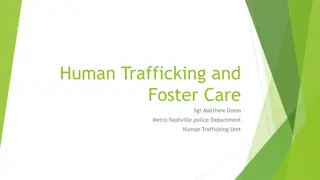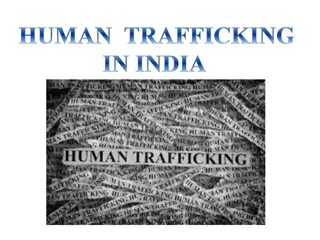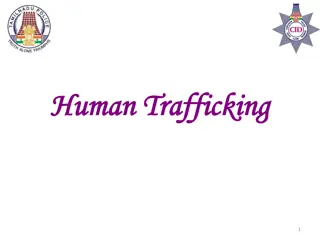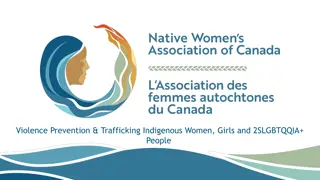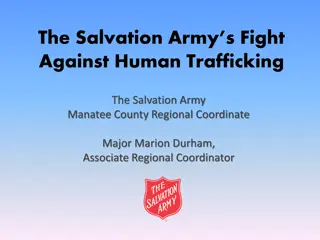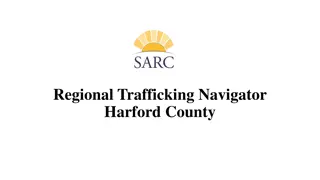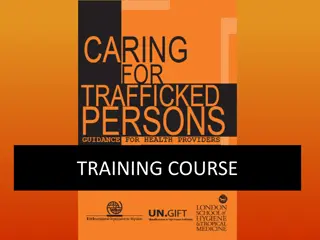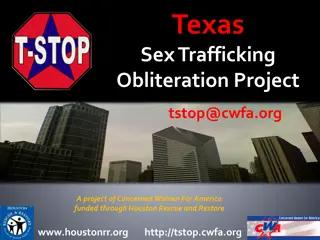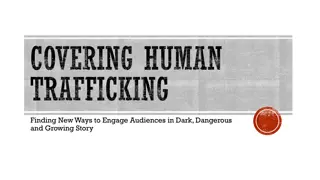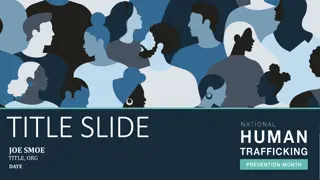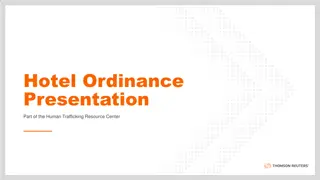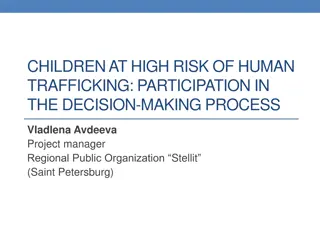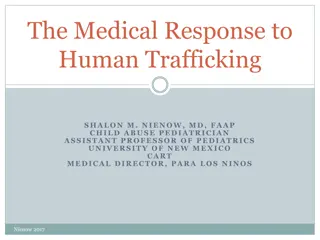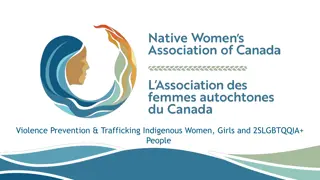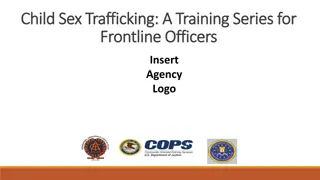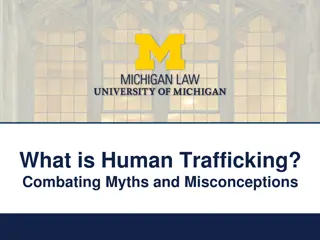Debunking the Super Bowl and Human Trafficking Myth
Debunking the myth that the Super Bowl is a major sex trafficking event, a study by Carnegie Mellon University found that while there is an increase in new-to-town escort ads around Super Bowls, it falls within expected variances. The study compared 33 events in the US and Canada, showing that other events had more significant increases in postings. The study suggests the need for a long-term response to combat human trafficking beyond just major events like the Super Bowl.
Download Presentation

Please find below an Image/Link to download the presentation.
The content on the website is provided AS IS for your information and personal use only. It may not be sold, licensed, or shared on other websites without obtaining consent from the author. Download presentation by click this link. If you encounter any issues during the download, it is possible that the publisher has removed the file from their server.
E N D
Presentation Transcript
Super Bowl and Human Trafficking Myth? Presented by: Minal Patel Davis Special Advisor to the Mayor on Human Trafficking Office of Mayor Sylvester Turner Office: (832) 393-0977 Cell: (832) 596-9965 E-Mail: Minal.Davis@houstontx.gov Website: HumanTraffickingHouston.org
II. Claims Surrounding Super Bowl and Sex Trafficking Debunk claims surrounding Super Bowl The Claims Super Bowl is the single largest sex trafficking incident in the U.S. Media claimed that anywhere from 10,000 to 100,000 sex slaves arrive in a host city Problem with Claims Not supported by data Data is evolving, discuss latest one of a kind study published in February 2016 by Carnegie Mellon
III. Latest Study Researchers with Carnegie Mellon University examined 33 events comparable to Super Bowl in the U.S. from October 2011 to February 2016, and in Canada from July 2013 to February 2016. Data set included over 32 million online sex ads, researchers used a 7 day window leading up to the event and a 91 day inference window making it a first of its kind of study. Study focused on online postings of new-to-town escort advertisements. The highest spikes in increased postings were in Vancouver, Myrtle Beach and Charlotte.
III. Latest Study - Continued The event associated with the spikes in Myrtle Beach was the Memorial Day bike rally. There was no major event in Vancouver and an unidentified local event in Charlotte. Increases in new to town ads for Super Bowl ranged from 19 to 91 ads during the past 4 Super Bowls, the influx of sex slaves to a Host Super Bowl City is much less than originally thought. There is a correlation between the Super Bowl that is statistically significant evidence of new to town ads, however, there are other events that show a more significant increase in postings than the Super Bowl. Finding: New to town ads increased around Super Bowls, but increase, while statistically significant, falls within the variance expected and predicted over time.
III. Latest Study - Continued Expected - New to town ads Town ads Difference Super Bowl City Observed -New to New to Town ads- Expected All ads Observed All ads All ads- Difference 2016 SB 50 San Jose 106 169 63 624 1,111 487 2015 SB 49 Phoenix 124 215 91 2,334 2,554 220 2014 SB 48 Manhattan 84 100 16 1,663 2,236 573 2013 SB 47 New Orleans 61 104 43 325 454 129 Volume of overall observed advertisements justify the need for a long term response. This ad volume ranged from 454 to 2,554 ads in different Super Bowl Host cities. The increases in overall observed ads for past Super Bowls range from 129 to 573 ads higher than expected. These include local and new to town ads. Other events like the Consumer Electronics Show, Formula 1, The Oracle World Convention also showed increases on par with past Super Bowls.
III. Latest Study - Continued our analysis highlights that human trafficking affects our country across varied locations, communities, and events, and we cannot isolate its impact to only one event per year. Miller, Kennedy, and Dubrawski, Do Public Events Affect Sex Trafficking Activity? : 6-8 (emphasis added). Reliance on quantitative evidence accessible through data- driven analysis can inform wise resource allocation, guide good policies, and foster the most meaningful impact. Miller, Kennedy, and Dubrawski: 8 (emphasis added).
IV. Guide to Approach From Jan to June 2015, Houston showed that we had over 20,000 online sex ad postings. Because we are soon to be the third largest city and we host a variety of events, we need a comprehensive and non reactive approach. None of the 33 events studied are on the GRB calendar, it is unclear what the impact is on increased ad postings for the specific events Houston is hosting. Because data continues to evolve, a 365 day-a-year response is best.
V. Anti-Human Trafficking Efforts - Highlights Vision and Goals Highlight components of City s Anti-Human Trafficking response that may be most relevant to hosting upcoming events. Institutionalize response to human trafficking from within the City of Houston, ensuring that trafficking is structurally addressed. Change the public s perception about human trafficking, leading to an increased awareness about, and reporting of, human trafficking. Partner with key private industries to raise awareness such as the hotel and taxi industry.
IV. Anti-Human Trafficking Efforts Highlights Cont d Objective: Institutionalize City of Houston Response and Implement Trainings Strategy: Analyze and Pass Ordinances and Departmental Policies Propose additional ordinance amendments as necessary. Houston Health Department has signed a policy requiring all 1,200 employees to be trained. Strategy: Implement Trainings or Informational Videos for City Departments Engage Houston Health Department, Houston Municipal Court, Houston Police Department (Jail Division), Houston Airport System, Houston Fire Department, and 311 operators. Highlight: Houston Airport System, incorporating a short video about human trafficking into their airport culture to recognize and report crime as part of their badging process.
IV. Anti-Human Trafficking Efforts Highlights Cont d Objective: Raise Awareness and Change Public Perception Strategy: Develop and launch joint anti human trafficking media campaign Leading campaign with HPD, the Harris County DA, and United Against Human Trafficking. A Houston PR/Consulting firm has offered to develop the campaign and donate all creative capital. Strategy: Hold Events to Raise the Level of Dialogue and Engage Influencers Convene human trafficking thought leaders in Houston on an annual basis. Screen Siddharth Kara s Hollywood feature film, Trafficked, and conclude with a panel discussion featuring Mr. Kara, Mayor Turner and Texas law enforcement officers. Developrelationships with influencers to engage their voice in the anti-trafficking movement and influence their fans (e.g. sports leagues and celebrities).
IV. Anti-Human Trafficking Efforts Highlights Cont d Objective: Implement Joint Initiatives of HAC-HT Background: The Houston Area Council on Human Trafficking is an initiative of the Mayor s Office. Stakeholders are convened to collaborate on joint anti-human trafficking initiatives framed by the vision and goals of the Mayor s Office. Law enforcement is represented, but HAC-HT does not operate in a law enforcement capacity. Strategy: Implement a Hotel Training Program Coordinate hotel-based voluntary trainings. Encourage voluntary trainings by speaking at Hotel and Motel Association events. Strategy: Engage Taxi Industry Identify and contact most-used taxi cab companies about implementing employee training and sending mass text and email blasts. Concentrate and coordinate blasts around events.
References For reference: Child Sex Rings Spike during Super Bowl Week, USA Today, February 1st, 2011. For reference: Kyle Miller, Emily Kennedy, and Artur Dubrawski, Do Public Events Affect Sex Trafficking Activity? published on-line by Auton Lab (February 15th, 2016): 1-10, accessed February 16th, 2016, www.arxiv.org/pdf/1602.05048v1.pdf. For reference: The inaugural symposium held on October 29th, 2015 featured Bradley Myles (Polaris' Chief Executive Officer), Siddharth Kara (wrote Sex Trafficking: Inside the Business of Modern Day Slavery), Brooke Axtell (Director of Communications and Engagement for Allies Against Slavery), and Dorchen Leidholdt (Director of the Center for Battered Women s Legal Services at Sanctuary for Families in NYC).



